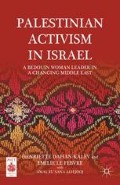Abstract
In early al-Naqab Bedouin society, mostly males participated in formal politics as women were largely excluded from direct action in official political venues, but as Amal’s grandmother Rukla describes, women did indirectly politically contribute in various ways. For example, women were often sent to collect information by tribal Shaykhs or male family members to neighboring tribes to locate important resources such as marriageable young women so that they could form important alliances with specific lineages (Marx 1967, Nelson 1974, Peters 1990). The women would accomplish these missions under the auspices of visiting family members, relatives, or neighboring women after which they would report to their Shaykh to give details about the situation and possible advice in order to achieve a desired alliance. From these initial investigations, some tribal leaders would make decisions as to whether or not they should pursue or negotiate for partnerships with other tribal fractions in al-Naqab. In addition to these types of indirect political influences, al-Naqab Bedouin women also served as important hostess, advisors, and go-betweens within their own families and their own internal political dealings. For example, sisters, wives, mothers, grandmothers, and daughters are often indirectly advised and mediated agnate-based political matters.
In my society women and their dealings are private matters. The women see me as representing them to the outside world, to say things to outsiders for them, to present their struggles trying to bridge the old way and new way of life. I work as an ambassador for them. I must to do this for them. It is hard for me to fail at something because I grew up in a place where I do not have the luxury of doing so. To do these things, I must deal with conflict and fight for freedom all the time but this War can also trap you. You must run all the time and keep busy doing activities. So my freedom is not real freedom for me. I don’t know real freedom. I feel confined to these things, to this reality. But I have two options. I can give up or I can keep going. I choose to keep going and this is my freedom.
(El’Sana-Alh’jooj 2007)
Access this chapter
Tax calculation will be finalised at checkout
Purchases are for personal use only
Preview
Unable to display preview. Download preview PDF.
Copyright information
© 2012 Henriette Dahan-Kalev and Emilie Le Febvre
About this chapter
Cite this chapter
Dahan-Kalev, H., Febvre, E.L. (2012). Mediations of a Leading al-Naqab Bedouin Female Activist. In: Palestinian Activism in Israel. Middle East Today. Palgrave Macmillan, New York. https://doi.org/10.1057/9781137048998_5
Download citation
DOI: https://doi.org/10.1057/9781137048998_5
Publisher Name: Palgrave Macmillan, New York
Print ISBN: 978-1-349-28777-2
Online ISBN: 978-1-137-04899-8
eBook Packages: Palgrave Political & Intern. Studies CollectionPolitical Science and International Studies (R0)

